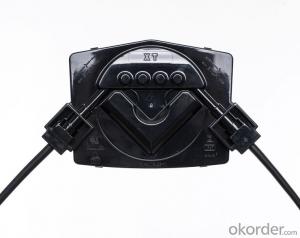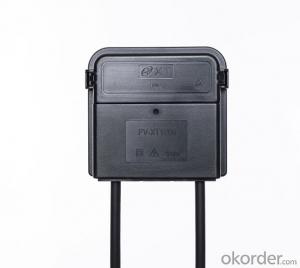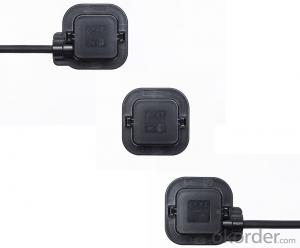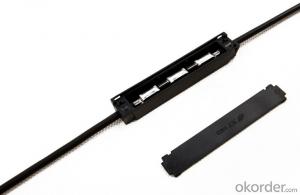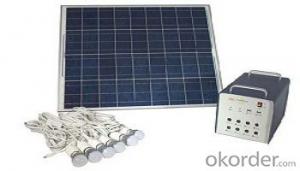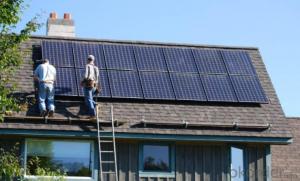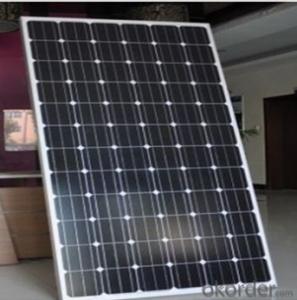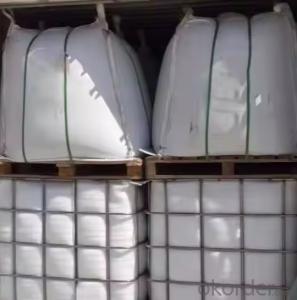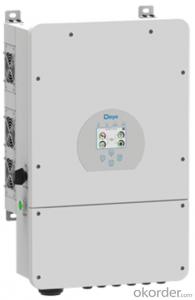PV Juction Box >> PV-0912 TUV、UL 、 ISO9001 Certification
- Loading Port:
- Guangzhou
- Payment Terms:
- TT OR LC
- Min Order Qty:
- 3000 pc
- Supply Capability:
- 3000000 pc/month
OKorder Service Pledge
OKorder Financial Service
You Might Also Like
Feature
a. copper design, good heat output
b. round sealing, good waterproof
c. cover replacement, easy maintenance
d. non-glue and ultra-thin
e. double-sided contact, low contact resistance
Item Data Terminals for Ribbons 4 Rated Current 8A/12A Rated Voltage 1000V Dimension 132*98.9*18.4mm Temperature -40℃~+85℃ Size of Cables 4m㎡/12AWG Size of Ribbons W(6mm)*T(0.2mm) Protection Degree IP67 Flammability Class V-0
Product description
1. All the connection made by double fixed connection low power loss
2. With the capacity of anti-aging and resistance to ultraviolet radiation on the outer cover with excellent box design with good thermal dissipation
3. Demonstrating safe, realiable and excellent lasting functionality, applicable in harsh outdoors working ambient
4. Big variety for choices,1 rail ,2 rail,3 rail,4 rail,5 rail,6 rail.mini junction box and solar junction box for solar street light
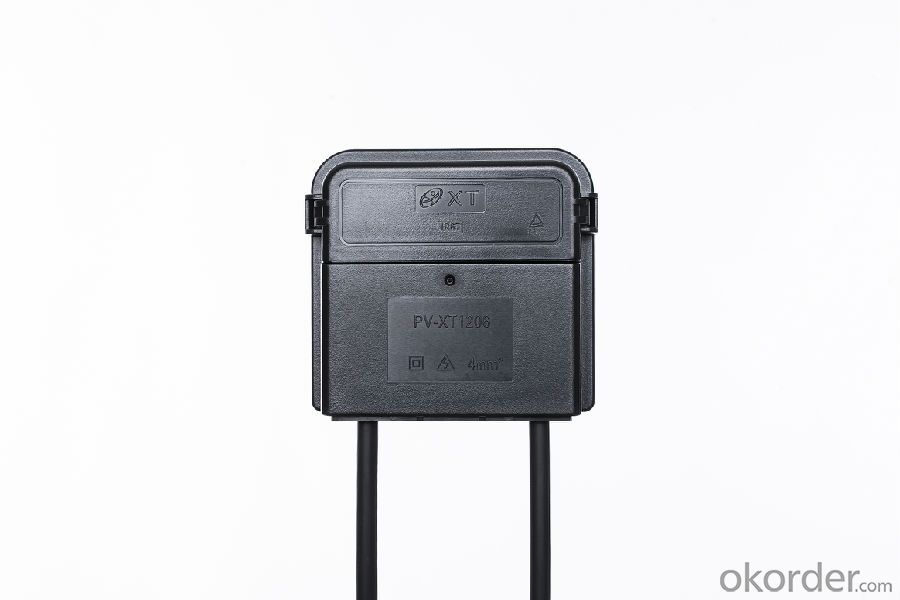
FAQ
1. How long will my inquiry get response?
Your inquiry related to our products or prices will be replied within 24 hours.
2. Can I get professional service and suggestion?
Well-trained and experienced staffs to answer all your questions in fluent English.
3. Do you accept OEM or customized design?
OEM & ODM, any your customized lightings we can help you to design and put into product.
4. What if I need specific design?
Distributorship are offered for your unique design and some our current models.
- Q:How do solar energy systems contribute to reducing the risk of power outages during extreme weather events?
- Solar energy systems contribute to reducing the risk of power outages during extreme weather events by providing a decentralized and reliable source of electricity. Unlike traditional power grids that are vulnerable to damage from storms, solar energy systems operate independently and can continue generating power even if the main grid goes down. This means that even during severe weather events, such as hurricanes or snowstorms, solar panels can still supply electricity to homes, businesses, and critical infrastructure, reducing the reliance on centralized power sources and minimizing the impact of power outages.
- Q:What is the role of disconnect switches in a solar energy system?
- The safe isolation of a solar energy system from the grid or other power sources is made possible by disconnect switches, which play a crucial role. During maintenance, repairs, or emergencies, these switches act as a safeguard by allowing the complete disconnection of solar panels or inverters from the electrical grid. A key function of disconnect switches is to protect both the system and the individuals involved in its operation. By preventing the flow of electricity from the solar panels to the grid, they ensure that no power is being generated or transferred during maintenance or repairs. This helps minimize the risk of electric shocks or accidents. In addition, disconnect switches help meet safety regulations and codes. They enable easy and quick disconnection of the solar energy system, which is often required during inspections or in the event of emergencies such as fires or natural disasters. By isolating the system, these switches help prevent any potential damage to the system or the grid. Furthermore, disconnect switches allow for efficient monitoring and control of the solar energy system. They provide a convenient way to shut down the system when necessary, facilitating troubleshooting or routine checks. By disconnecting the solar panels, inverters, or battery storage systems, these switches optimize the overall system's efficiency and performance. In conclusion, disconnect switches in a solar energy system ensure the safety of individuals involved, comply with safety regulations, protect the system and the grid from damage, and enable efficient monitoring and control. As an essential component, these switches enable the safe and effective operation of solar energy systems.
- Q:Can solar energy systems be used in areas with extreme temperatures?
- Yes, solar energy systems can be used in areas with extreme temperatures. Solar panels are designed to withstand a wide range of temperatures, from extreme cold to excessive heat. However, extreme temperatures can affect the efficiency of the panels. In extremely cold conditions, snow or ice can cover the panels, reducing their ability to generate electricity. Similarly, in extremely hot climates, high temperatures can reduce the overall output of the panels. Nonetheless, with proper design, insulation, and maintenance, solar energy systems can still be effectively utilized in areas with extreme temperatures.
- Q:How does solar energy storage work?
- Harnessing the power of the sun and meeting our energy needs even when the sun isn't shining requires crucial solar energy storage. This involves capturing and storing the surplus energy produced by solar panels during peak sunlight hours. Later, when electricity demand is high or during nighttime, this stored energy can be utilized. There are various methods for solar energy storage, with one of the most popular being the use of batteries. These batteries, typically made of lithium-ion or lead-acid, store the excess electricity generated by the solar panels. During daylight hours, any surplus energy not immediately consumed is directed towards charging the batteries. Once the batteries are fully charged, the excess energy is stored and can be used later when the solar panels are not generating electricity, such as at night or on cloudy days. This stored energy can then be released into the electrical system, powering buildings and homes. Another approach to solar energy storage involves utilizing thermal energy storage systems. These systems capture solar energy in the form of heat and store it in materials like water, molten salt, or phase-change materials. The stored heat can then be converted into electricity or used for heating and cooling purposes in buildings. The stored solar energy can also be directly used to power devices or appliances, bypassing the electrical grid. This is especially beneficial in remote areas or during power outages, where having a reliable and independent energy source is crucial. In conclusion, solar energy storage is essential for maximizing the efficiency and dependability of solar power systems. It enables us to store excess energy during peak sunlight hours and use it when needed, reducing our dependency on traditional fossil fuel-based energy sources and contributing to a more sustainable and environmentally friendly energy future.
- Q:Can solar energy systems be used in remote locations?
- Yes, solar energy systems can be used in remote locations. Since solar energy relies on sunlight, it can be harnessed and utilized in virtually any location as long as there is access to sunlight. This makes solar energy an excellent option for powering remote areas where traditional electrical infrastructure may be limited or nonexistent. Additionally, advancements in solar technology have made it more efficient and cost-effective, further enabling its use in remote locations.
- Q:Can solar panels be installed on mobile homes or trailers?
- Yes, solar panels can be installed on mobile homes or trailers. In fact, they are a popular choice for those who live in these types of homes as they provide an efficient and sustainable source of energy. The panels can be mounted on the roof or ground-mounted near the mobile home or trailer, providing electricity for various purposes.
- Q:Can a solar energy system be installed in areas with high humidity?
- In areas with high humidity, it is indeed possible to install a solar energy system. Although the efficiency of solar panels may be somewhat affected by the humidity, it does not entirely hinder the installation or operation of these systems. The primary factor that affects the performance of solar panels is the amount of sunlight they receive rather than the level of humidity. However, it is crucial to bear in mind that excessive humidity or moisture has the potential to cause corrosion or harm to the electrical components of the system. Consequently, it is necessary to take proper precautions and conduct regular maintenance in order to ensure the longevity and optimal functioning of the solar energy system in areas with high humidity.
- Q:Can solar energy systems be used in powering desalination plants?
- Yes, solar energy systems can be used to power desalination plants. Solar-powered desalination systems use solar panels to convert sunlight into electricity, which is then used to power the desalination process. This sustainable approach not only reduces reliance on fossil fuels but also helps address the water scarcity issue by producing freshwater from seawater in an environmentally friendly manner.
- Q:How do solar energy systems affect property value?
- Solar energy systems can have a positive impact on property value. Studies have shown that homes with solar panels tend to sell for a higher price compared to similar homes without them. This is because solar panels reduce energy costs, provide a sustainable energy source, and can even generate income through net metering. Additionally, potential buyers are increasingly interested in eco-friendly and energy-efficient features, making solar energy systems an attractive investment that can enhance property value.
- Q:Can solar energy systems be installed on ground-mounted structures?
- Yes, solar energy systems can be installed on ground-mounted structures. These structures provide a stable and efficient platform for solar panels, allowing them to be positioned at an optimal angle for capturing sunlight. Ground-mounted systems are often used in areas where roof space is limited or not suitable for installation, making them a popular choice for residential, commercial, and utility-scale solar projects.
1. Manufacturer Overview |
|
|---|---|
| Location | |
| Year Established | |
| Annual Output Value | |
| Main Markets | |
| Company Certifications | |
2. Manufacturer Certificates |
|
|---|---|
| a) Certification Name | |
| Range | |
| Reference | |
| Validity Period | |
3. Manufacturer Capability |
|
|---|---|
| a)Trade Capacity | |
| Nearest Port | |
| Export Percentage | |
| No.of Employees in Trade Department | |
| Language Spoken: | |
| b)Factory Information | |
| Factory Size: | |
| No. of Production Lines | |
| Contract Manufacturing | |
| Product Price Range | |
Send your message to us
PV Juction Box >> PV-0912 TUV、UL 、 ISO9001 Certification
- Loading Port:
- Guangzhou
- Payment Terms:
- TT OR LC
- Min Order Qty:
- 3000 pc
- Supply Capability:
- 3000000 pc/month
OKorder Service Pledge
OKorder Financial Service
Similar products
New products
Hot products
Hot Searches
Related keywords
